Trading APIs enable automated trading, faster execution, and access to extensive data, providing unique opportunities to capitalise on the forex market. These APIs are essential tools for traders seeking to optimise their trading strategies and gain a competitive edge in the market. In this article, we will review the ten best forex brokers that offer trading APIs, highlighting their key benefits, such as if it’s cost-efficient, easy to use, offers live market data, and historical prices to help you pick the best option.
These ten best forex brokers with trading APIs each offer a unique advantage to enhance your trading experience:
Broker:
Trading API Type:
Advantages:
Account:
FIX FX API
- ECN Accounts
- Spreads from 0.0 Pips
- Copy Trading available
- Leverage up to 1:500
- Low Commission from 1.5$/1 Lot
- High liquidity and fast execution
- TradingView, MT4/5, cTrader, Pro Trader
FIX, REST API
- No Minimum Deposit
- Spreads from 0.0 Pips
- 26,000+ Markets
- Leverage up to 1:500
- Low Commission from 2$/1 Lot
- High liquidity and fast execution
- TradingView, MT4/5, cTrader, Invest Account
- New Zealand regulated
FIX and cTrader Automate.API
- Tier-1 Regulated Broker
- Spreads from 0.0 Pips
- Leverage up to 1:500 (1:30 EU)
- Low Commission from 3$/1 Lot
- High liquidity and fast execution
- TradingView, MT4/5, cTrader
REST and Streaming API
- No Minimum Deposit
- Spreads from 0.6 Pips
- Access to 17,000+ Markets
- Leverage up to 1:200
- Low Commissions from $3 per trade
- Regulated by Tier-1 Authorities (FCA, ASIC, MAS)
FIX, REST API
- Spreads from 0.0 pips
- Commissions $3 per side
- Copy Trading
- MT4, MT5, WebTrader, cTrader
- 24/7 support
- Multiple Regulations (ASIC, CySEC, & more)
REST and WebSocket API
- Multiple regulations
- Leverage up to 1:300
- No Commission
- High liquidity and fast execution
- 3,000+ tradable assets
- TradingView, MetaTrader 4
REST API, Java API, FIX API, ForexConnect API
- 1,000+ available assets
- Standalone or Trading Station
apps - Leverage up to 1:1000
- Multi-regulated, e. g. ASIC & FCA
Using API via MT4 and MT5 API
- Tier-1 Regulated Broker
- Spreads from 0.0 Pips
- Minimum Deposit $10
- 227+ Tradable Assets
- Social Trading App, Exness Trading App, MT4/5
FIX API and Automate API via cTrader
- Spreads from 0.0 pips
- Commissions $3 per side
- Copy Trading
- MT4, MT5, WebTrader, cTrader
- 24/7 support
- Multiple Regulations (ASIC, CySEC, & more)
FIX, REST API
- Multiple regulations
- Spreads from 0.0 Pips
- Commission: fixed $5 per $100k USD traded on FX
- More than 80 FX pairs
- Leverage up to 1:50
- Forex.com App, Forex.com Web Trader, MT5
List of the Best 10 Forex Brokers With Trading APIs
When it comes to forex trading, having access to a reliable and efficient trading API can significantly enhance your trading experience. In this section, we will review the four best forex brokers offering robust trading APIs.
1. Vantage Markets

Our top choice for API trading with a score of 5/5 is Vantage Markets because of its low-fee trading conditions and ease of use. The Vantage FX API offers a straightforward integration process that is easy to implement. It’s designed to work seamlessly with popular platforms like MetaTrader 4 and 5, enabling you to automate your trading strategies with ease.
The broker provides access to over 40 forex pairs, so you have plenty of pairs to trade. The API’s low latency is impressive, varying from 25ms to 70ms depending on conditions. Spreads start from a razor-thin 0.0 pips, and the leverage goes up to 500:1, providing the flexibility needed to maximize your trading potential. Also, if you ever encounter a problem, their top-notch customer support is just a call away, ready to assist with any API-related issues.
Another benefit of the Vantage FX API is its comprehensive data streaming capability. This allows traders to receive real-time updates on price movements, which is crucial for executing timely trades. The API also supports a variety of order types, from market and limit orders to more advanced types like stop orders, giving you full control over your trading strategy. This makes Vantage Markets a versatile choice for traders.
| Feature | Information |
|---|---|
| API Type | FIX FX API |
| Spreads and Commission | Email, live chat, and phone support are available. |
| Trading Platforms | Vantage App, MetaTrader 4, MetaTrader 5, and ProTrader. |
| Asset Types | Forex, stocks, indices, commodities, bonds, and ETFs. |
| Tradable Assets | Over 1,000 |
| Currency Pairs | Over 40 |
| Leverage | 500:1 |
| Customer Support | Email, live chat, and phone suppor are available. |
| Demo Account | Yes |
| Educational Content | Courses, webinars, and ebooks. |
| Regulation | ASIC and CIMA |
2. BlackBull Markets
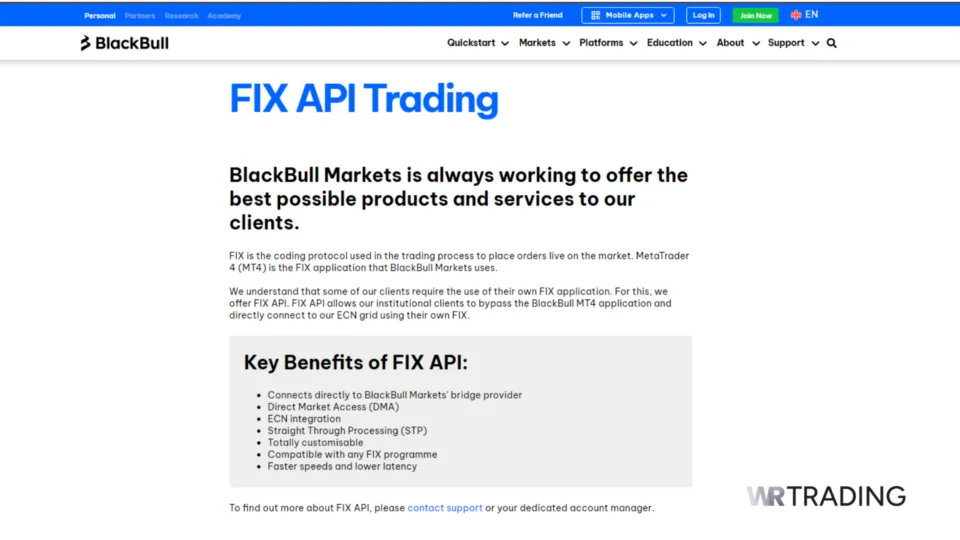
When it comes to advanced trading capabilities, BlackBull Markets doesn’t disappoint. The BlackBull Markets API is built for speed and reliability, making it one of our favourites among professional traders who need performance. This API isn’t just about speed; it supports a plethora of trading functionalities, from detailed market data retrieval to sophisticated order management.
BlackBull Markets offers over 70 forex pairs, catering to a wide range of trading strategies. Their spreads are competitive, starting at 0.0 pips, and they offer leverage up to 500:1. The API’s high execution speed is a dream come true for high-frequency traders, ensuring that trades are processed quickly. Additionally, the API’s scalability makes it suitable for handling large volumes of data, making it perfect for institutional traders seeking a reliable trading partner.
The BlackBull Markets API features extraordinary security measures, ensuring your data and transactions are protected at all times. It supports both REST and FIX API protocols, offering flexibility tailored to your specific technical requirements. The detailed and precise API documentation ensures that even complex integrations can be handled smoothly and efficiently. This makes BlackBull Markets an excellent choice for traders looking to implement sophisticated trading strategies with minimal hassle.
| Feature | Information |
|---|---|
| API Type | FIX, REST |
| Spreads and Commission | Email, live chat, and phone support are available. |
| Trading Platforms | MetaTrader 4, MetaTrader 5, MetaTrader Web Trader, cTrader, TradingView, and BlackBull Trade. |
| Asset Types | Forex, commodities, indices, cryptocurrencies, futures, and stock. |
| Tradable Assets | Over 26,000 |
| Currency Pairs | Over 70 |
| Leverage | 500:1 |
| Customer Support | Email, live chat, and phone suppor are available. |
| Demo Account | Yes |
| Educational Content | Webinars, tutorials, education hub, |
| Regulation | Financial Services Authority in Seychelles |
3. Pepperstone
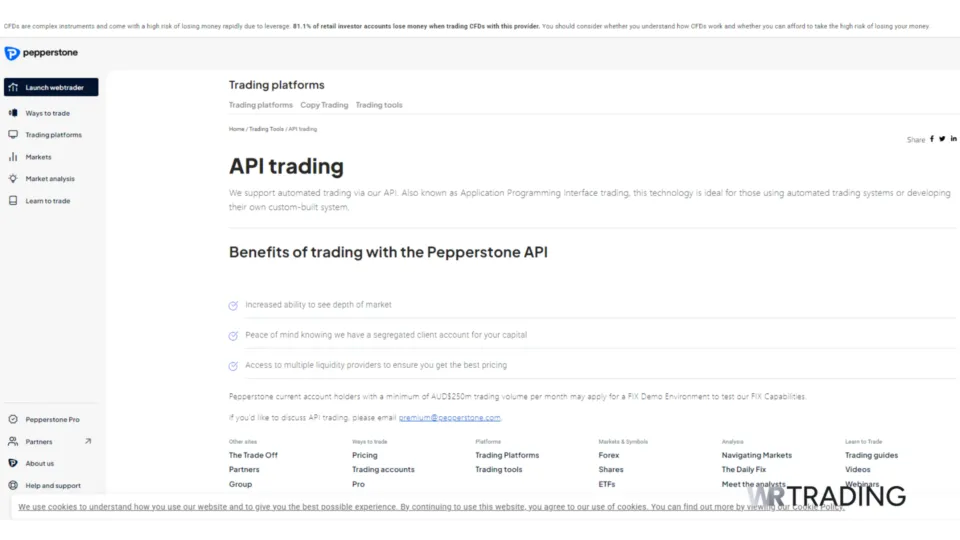
Pepperstone stands out for its exceptional API documentation, which is a lifesaver for both traders and developers. The Pepperstone API is comprehensive, offering detailed guides that make implementation easy, even for those new to API trading. This broker supports more than 90 forex pairs, giving you a broad spectrum of trading opportunities.
Spreads at Pepperstone start from an impressively low 0.0 pips, and leverage can go up to 500:1, allowing you to tailor your trading strategies precisely. The API integrates seamlessly with leading trading platforms, including MetaTrader 4, MetaTrader 5, and cTrader, offering a versatile and efficient trading experience. The API’s focus on speed and reliability ensures your trades are executed without a hitch, making it ideal for those who rely heavily on algorithmic trading.
Pepperstone’s API offers extensive historical data, which is invaluable for backtesting trading strategies. The real-time data streaming ensures you are always in sync with the latest market movements, and the API’s flexibility allows for the creation of custom trading tools and indicators. This combination of detailed documentation, comprehensive data access, and robust performance makes Pepperstone a top choice for traders looking to leverage API trading effectively.
| Feature | Information |
|---|---|
| API Type | FIX and cTrader Automate.API |
| Spreads and Commission | Varies based on account:Spread – from 0.0 pips Commission – From no commission to $3 per lot |
| Trading Platforms | MetaTrader 4, MetaTrader 5, cTrader, and TradingView |
| Asset Types | Forex, commodities, indices, cryptocurrency, stocks, and ETFs. |
| Tradable Assets | Over 1,200 |
| Currency Pairs | Over 90 |
| Leverage | 500:1 |
| Customer Support | Email and phone support. |
| Demo Account | Yes |
| Educational Content | Webinars, educational videos, and trading guides. |
| Regulation | FCA, CySEC, ASIC, BaFin, CMA, and DFSA. |
4. IG
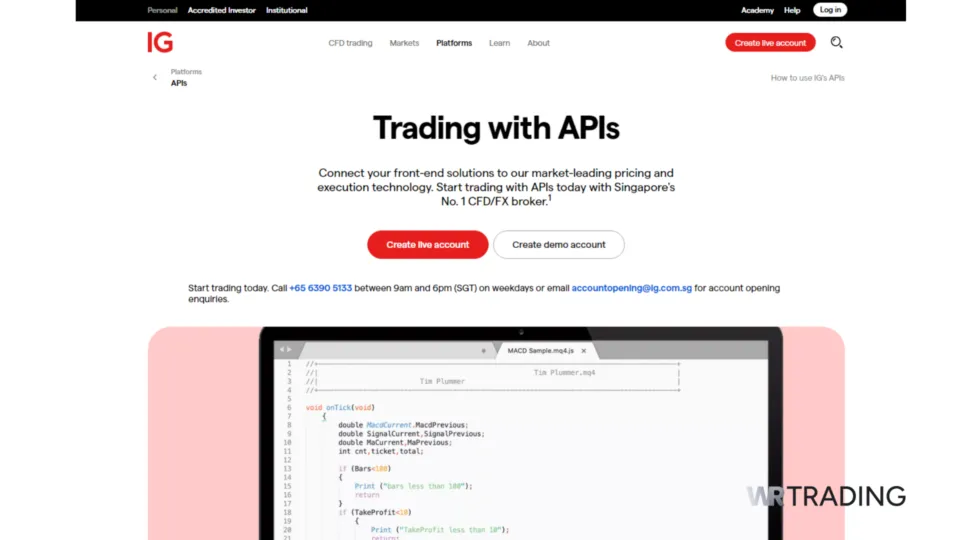
IG is one of the safest API brokers in forex trading due to the extensive regulation from top-tier authorities like BaFin, ASIC, FCA, and several others. They offer an API that provides extensive market access and a suite of powerful trading tools. The IG Labs API is designed in an easy way, so integration with various platforms, including their proprietary ProRealTime, is straightforward. This flexibility allows traders to automate their strategies and leverage advanced trading features effectively.
IG gives you one of the most extensive market selections available, with access to over 80 forex pairs. Spreads start from a competitive 0.6 pips, and leverage is available up to 200:1. The broker provides comprehensive support for API users, including detailed guides and tutorials to help you get the most out of their trading tools.
The IG Labs API also has advanced order functionality, including complex order types and conditional orders, which can be essential for sophisticated trading strategies. It supports both REST and streaming APIs, providing flexibility in how you manage and execute your trades. Furthermore, IG’s API offers performance metrics and analytics tools, helping you refine and optimize your trading strategies based on detailed data insights. This makes IG not just a trading platform but a comprehensive toolkit for serious traders.
| Feature | Information |
|---|---|
| API Type | REST and Streaming API |
| Spreads and Commission | Email, live chat, and phone support are available. |
| Trading Platforms | MetaTrader 4, MetaTrader 5, cTrader, and TradingView |
| Asset Types | Forex, commodities, indices, cryptocurrency, stocks, options, and futures. |
| Tradable Assets | Over 17,000 |
| Currency Pairs | Over 80 |
| Leverage | 200:1 |
| Customer Support | Email, live chat, and phone support are available. |
| Demo Account | Yes |
| Educational Content | IG Academy |
| Regulation | BMA |
5. IC Markets
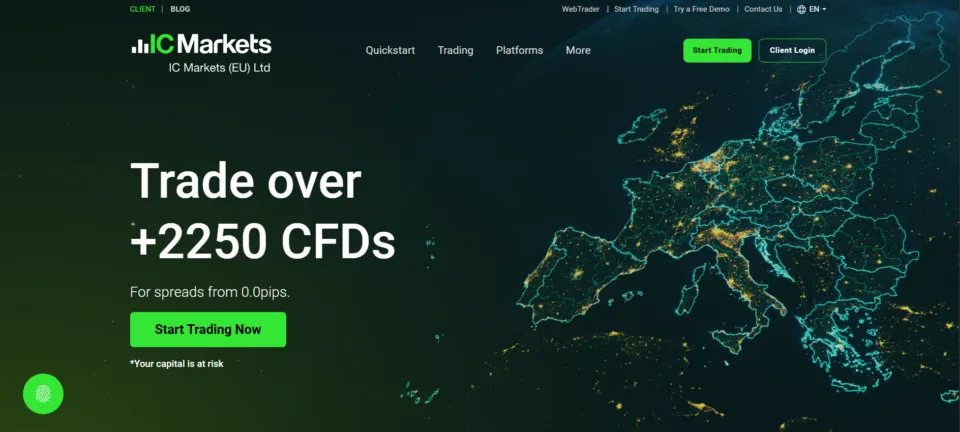
IC Markets offers one of the most advanced infrastructures for API traders through its FIX API connection, designed for high-frequency strategies and institutional-level trading. Latency is extremely low, averaging under 40 milliseconds on live accounts hosted in Equinix data centers, which makes it suitable for scalping and automated systems that depend on rapid execution. Pricing is transparent with spreads on EUR/USD averaging 0.1 pips on Raw accounts, while commissions are set at $3.50 per lot per side.
The FIX API is available to traders who meet minimum monthly volume requirements, making it more accessible to serious users than purely institutional accounts. Unfortunately, this does mean smaller accounts cannot utilize the FIX API.
IC Markets also supports cTrader Automate API for developers who want to build strategies in C#. A limitation is that retail traders using smaller account sizes under $1,000 and less than $25 million in trading volume may find the FIX API requirements restrictive, as they are clearly designed to filter for active or professional clients.
| Feature | Information |
|---|---|
| API Type | FIX API and cTrader API |
| Spreads and Commission | Varies based on account:Spread – from 0.1 pipsCommission – $3.50 per lot |
| Trading Platforms | MetaTrader 4, MetaTrader 5, cTrader, and TradingView, with API access. |
| Asset Types | Forex, commodities, indices, bonds, cryptocurrency, stocks, and futures. |
| Tradable Assets | Over 2,250 |
| Currency Pairs | Over 60 |
| Leverage | 500:1 |
| Customer Support | Email, live chat, and phone support. |
| Demo Account | Yes |
| Educational Content | IC Markets educational section |
| Regulation | CySEC, FSA, CMA, and SCB. |
6. Capital.com
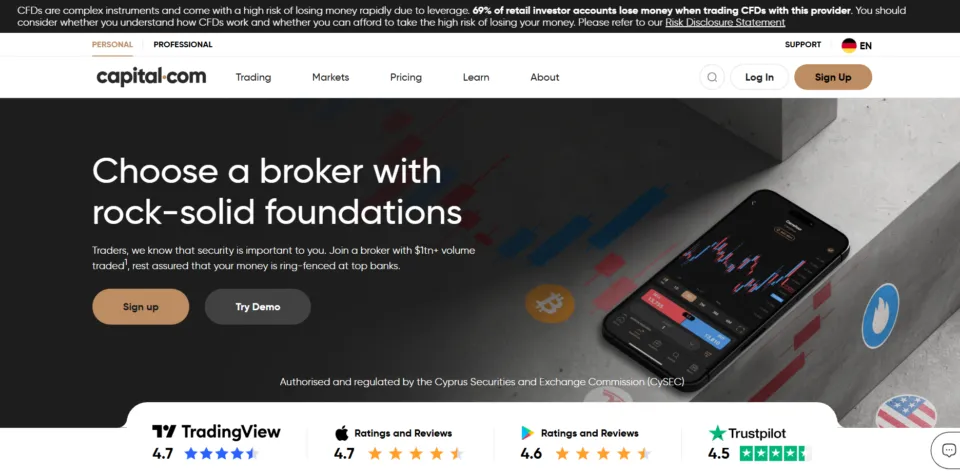
Capital.com provides a REST API and WebSocket API, allowing traders to integrate custom-built systems directly into their accounts for market data and execution. The API is free to access and comes with detailed documentation, which lowers the barrier for developers who want to automate strategies without complex onboarding. Capital.com charges no commissions, operating instead on spread-only pricing, with EUR/USD spreads starting from 0.6 pips.
The broker gives access to over 100 forex pairs, which provides enough scope for most API-based strategies without becoming overwhelming. Execution speeds average around 50 milliseconds, which is acceptable for automated systems but slower than brokers focused on institutional clients.
A drawback of Capital.com is that the API functionality is primarily REST-based, which may feel limiting compared to brokers that offer FIX APIs for ultra-low latency use cases. In our opinion, Capital.com is best for those new to API trading and require in-depth guides alongside MetaTrader 4 and TradingView.
| Feature | Information |
|---|---|
| API Type | REST and WebSocket API |
| Spreads and Commission | Varies based on account:Spread – Varies based on market conditionsCommission – No commission |
| Trading Platforms | TradingView, MetaTrader 4, with API access. |
| Asset Types | Forex, indices, commodities, ETFs, stocks, cryptocurrencies |
| Tradable Assets | Over 3,000 |
| Currency Pairs | Over 125 |
| Leverage | 300:1 |
| Customer Support | Email, live chat, and phone support. |
| Demo Account | Yes |
| Educational Content | Learning hub, market guides, and trading strategies |
| Regulation | CySEC, FCA, SCB, ASIC, and FSA. |
7. FXCM
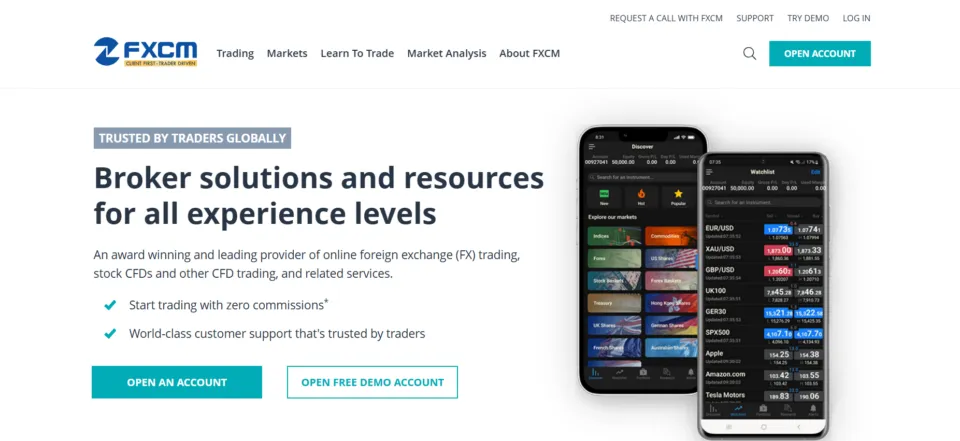
FXCM provides a wide range of APIs, including REST, FIX, Java, and ForexConnect, which makes it attractive to traders who want flexibility in how they design their systems. The FIX API targets institutions and high-frequency users, while REST and Java APIs are suitable for retail traders who want more accessible integration. Commissions are based on notional value, starting at $25 per million traded per side, which aligns costs directly with trading volume.
Average execution speed is around 30 milliseconds, supported by data centers in London and New York. This makes FXCM’s API solutions viable for latency-sensitive strategies such as scalping or news trading.
One limitation is that the broker’s market coverage is narrower than some competitors, with around 40 forex pairs, so traders looking for broader diversification may find the offering restrictive. However, they do have very high leverage reaching 1000:1 and provide top trading software like MetaTrader 4, TradingView Pro, and Trading Station.
| Feature | Information |
|---|---|
| API Type | REST API, Java API, FIX API, ForexConnect API. |
| Spreads and Commission | Varies based on account:Spread – Varies based on market conditionsCommissions based from $25 million per side on major pairs. |
| Trading Platforms | Trading Station, TradingView Pro, and MetaTrader 4, with API access. |
| Asset Types | Forex, indices, commodities, stocks, and cryptocurrencies |
| Tradable Assets | Over 200 |
| Currency Pairs | Over 40 |
| Leverage | 1000:1 |
| Customer Support | Email, live chat, and phone support. |
| Demo Account | Yes |
| Educational Content | Webinars and trading guides. |
| Regulation | FCA, ASIC, FSCA, and CySEC. |
8. Exness
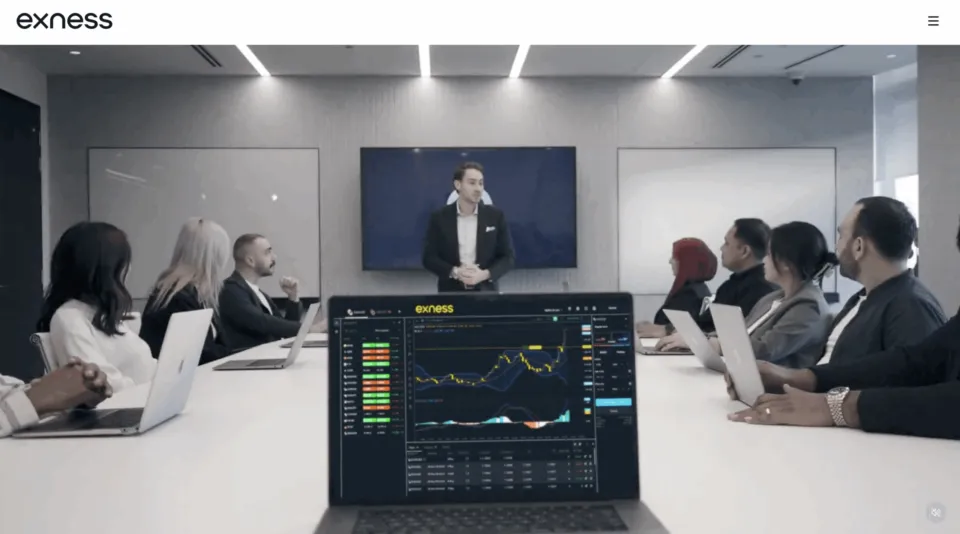
Exness offers access to API trading through its MetaTrader 4 and 5 platforms, giving developers the ability to integrate automated strategies with these popular trading softwares. Spreads on Raw accounts average 0.1 pips on EUR/USD, with commissions of $3.50 per lot per side, making it cost-efficient for traders using API. Execution speeds are competitive, averaging around 25 milliseconds, which ensures trailing stops, algorithms, and other automated functions run fast.
The standout feature is Exness’ leverage model, which allows unlimited leverage under certain account conditions, giving traders flexibility for testing strategies with smaller margin requirements. While this is attractive for some, it can expose inexperienced traders to higher risks if not managed carefully, so we recommend using a lower leverage at first for beginners.
Another limitation is that Exness does not currently offer FIX API access, which means advanced institutional-level traders may prefer our other recommended brokers that do. Also, the broker offers MetaTrader 4 and 5 with access to the Exness Terminal that integrates with the broker’s services and can be used with MT5 trading accounts.
| Feature | Information |
|---|---|
| API Type | Using API via MT4 and MT5 API |
| Spreads and Commission | Varies based on account:Spread – from 0.1 pipsCommission – $3.50 per lot |
| Trading Platforms | Exness Terminal, MetaTrader 4, and MetaTrader 5, with API access. |
| Asset Types | Forex, metals, indices, equities, energies, and cryptocurrency. |
| Tradable Assets | Over 200 |
| Currency Pairs | Over 100 |
| Leverage | 1:unlimited, depending on account size |
| Customer Support | Email, live chat, and phone support. |
| Demo Account | Yes |
| Educational Content | Trading guides |
| Regulation | FSA, CySEC, BVI FSC, and DFSA. |
9. IC Trading
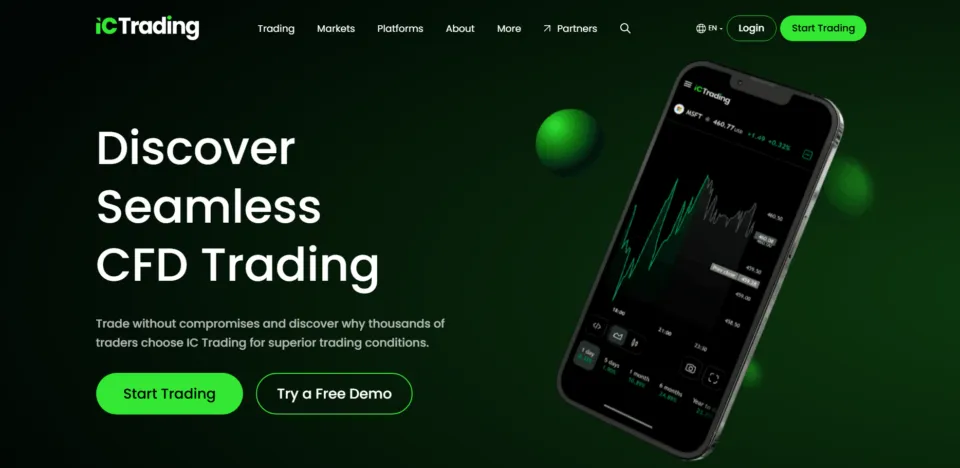
IC Trading supports algorithmic strategies through its FIX API and cTrader Automate API, giving traders the option to choose between professional-level infrastructure and more retail-friendly development environments. Spreads on Raw accounts begin from 0.0 pips, with commissions of $3.50 per lot per side, keeping transaction costs predictable for high-volume API trading.
We liked the execution speeds that averaged around 20 to 25 milliseconds during our testing, making it one of the fastest options for traders running latency-sensitive models. The broker supports over 60 forex pairs, providing enough pairs for diversified strategies without unnecessary complexity.
The FIX API requires a higher account size and trading activity, which suits active professional users, while cTrader Automate offers easier access for developers building custom bots or indicators. A drawback is that IC Trading’s support and documentation for the APIs are less comprehensive than what larger global brokers provide, which can increase the learning curve for developers.
| Feature | Information |
|---|---|
| API Type | FIX API and Automate API via cTrader |
| Spreads | Varies based on account:Spread – from 0.0 pipsCommission – From $3.50 per lot |
| Trading Platforms | MetaTrader 4, MetaTrader 5, and cTrader, with API access. |
| Asset Types | Forex, commodities, indices, stocks, bonds, futures, and cryptocurrency. |
| Tradable Assets | Over 2,100 |
| Currency Pairs | Over 60 |
| Leverage | 1:500 |
| Customer Support | Email, help center, live chat, and phone support. |
| Demo Account | Yes |
| Educational Content | Educational section and platform guides |
| Regulation | Financial Services Commission of Mauritius |
10. Forex.com
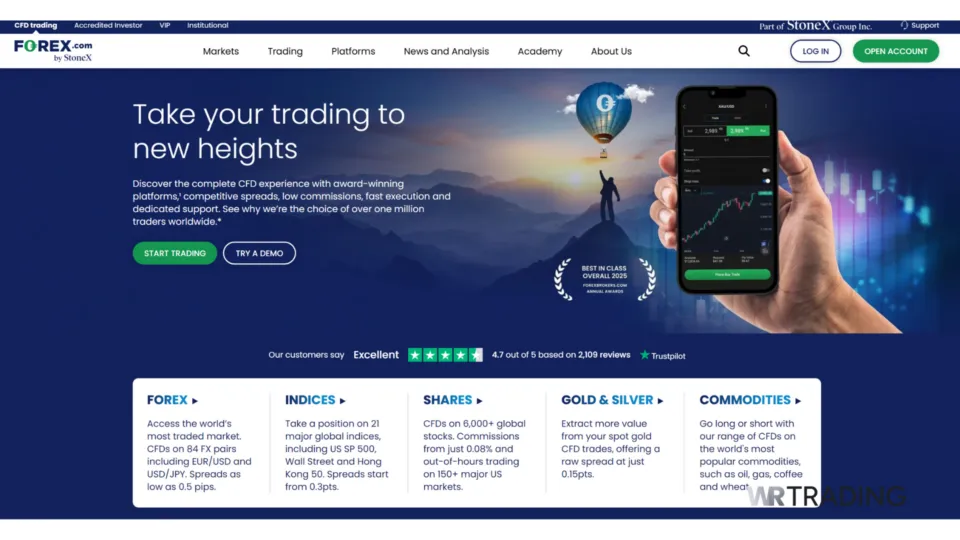
Forex.com provides a REST API that gives traders access to live market data, order management, account history, and trade automation. The API supports multiple programming languages such as Python, C++, VB.NET, and Perl, allowing traders to connect via HTTP with flexibility depending on their setup. However, for those requiring more advanced functionality, an institutional-grade FIX API is also available, which delivers lower latency and deeper liquidity access.
Execution speeds on Forex.com average around 50 to 60 milliseconds, making the platform capable of handling most algorithmic strategies without delays that could impact results. Developers benefit from detailed documentation, sample code, and dedicated technical support, which makes building and testing trading systems easier. A drawback is that leverage is limited to 500:1, depending on your region, and the commission is based on volume traded, not per lot.
| Feature | Information |
|---|---|
| API Type | REST API and FIX API |
| Spreads and Commission | Varies based on account: Spread – from 0.0 pips Commission – from $60 per million traded |
| Trading Platforms | MetaTrader 4, MetaTrader 5, WebTrader, Forex.com App, with API access. |
| Asset Types | Forex, commodities, indices, shares, crypto |
| Tradable Assets | Over 4,500 |
| Currency Pairs | Over 80 |
| Leverage | Up to 500:1 |
| Customer Support | 24/5 phone, email, and live chat |
| Demo Account | Yes |
| Educational Content | Guides, video tutorials, webinars |
| Regulation | CIRO, CySEC, CFTC, NFA, CIMA, FCA, SFC, JFSA, MAS, and ASIC. |
What Is a Forex Trading API?
A Forex Trading API (Application Programming Interface) is a set of protocols and tools that allows traders to interact with a broker’s trading platform programmatically. Essentially, it provides a way for software applications to communicate with the trading platform, enabling automated trading, real-time data access, and advanced order management. This technology has revolutionised forex trading by allowing traders to implement sophisticated trading strategies that can execute trades far faster than humans can.
Types of Different Trading APIs
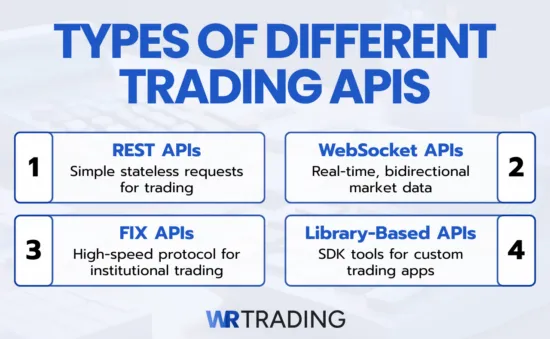
Trading APIs come in various forms, each designed to meet specific trading needs and preferences. Understanding the different types of APIs can help traders select the most suitable one for their trading strategies and objectives.
REST APIs
REST (Representational State Transfer) APIs are widely used due to their simplicity and ease of use. They allow traders to interact with the trading platform using standard HTTP requests. REST APIs are typically stateless, meaning each request from client to server must contain all the information needed to understand and process the request. This makes REST APIs straightforward to implement and use, even for those new to programming. They are well-suited for tasks like retrieving market data, placing orders, and managing accounts.
The key benefit of REST APIs is their broad compatibility and flexibility, making them a popular choice for many traders.
WebSocket APIs
WebSocket API offers a more interactive and real-time connection compared to REST APIs. They enable continuous, bidirectional communication between the client and the server. This means that once a WebSocket connection is established, data can flow freely and instantly in both directions. WebSocket APIs are ideal for applications that require real-time updates, such as live price feeds, trade executions, and dynamic charting tools.
The primary advantage of WebSocket APIs is their ability to provide low-latency, real-time data, which is crucial for high-frequency trading and other time-sensitive trading strategies.
FIX APIs
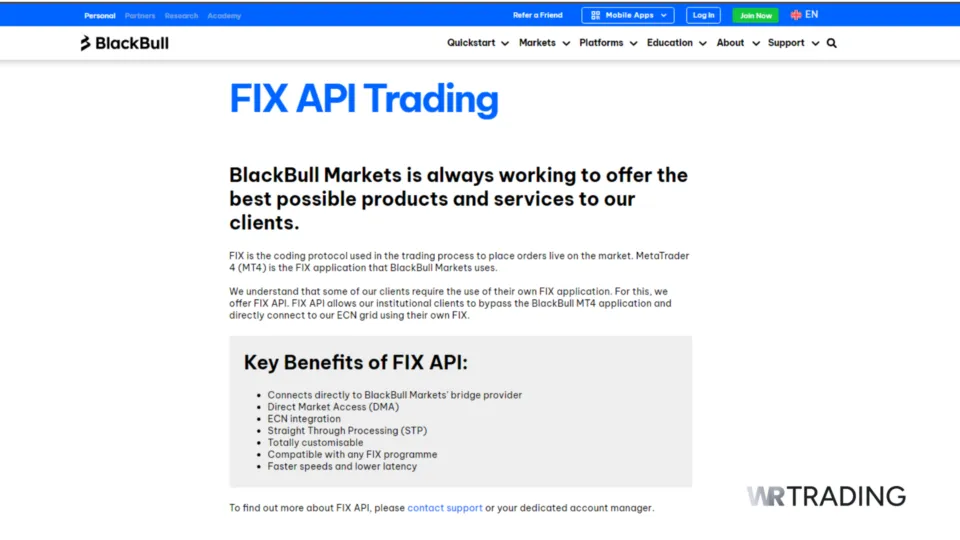
FIX (Financial Information Exchange) APIs are a standard protocol used by institutional traders and large financial firms. They are designed for high-speed trading and efficient handling of large volumes of transactions. FIX APIs are highly customizable and can be tailored to specific trading needs, making them suitable for sophisticated trading strategies. They support a wide range of functionalities, including order management, market data retrieval, and trade execution.
The main benefit of FIX APIs is their robustness and efficiency, making them the preferred choice for professional and institutional traders who require a high level of performance and reliability.
Library-Based APIs
Library-based APIs are another significant type of trading API, often used by developers who prefer to work within a specific programming environment. These APIs come in the form of libraries or SDKs (Software Development Kits) that can be integrated into a developer’s application.
They provide pre-built functions and tools for interacting with the trading platform, making it easier to develop custom trading applications.
Which Forex Broker API Is Free To Use?
Not every broker charges for API connectivity, and the way access is structured often depends on the type of API and the level of trading activity. Some brokers provide full access for free, while others reserve advanced options like FIX APIs for clients who meet volume requirements or pay additional fees. Knowing the difference helps traders decide which broker aligns with their budget and automation needs.
Free APIs from Retail Brokers
OANDA, FXCM, IG, XTB, and FOREX.com all give clients API access at no monthly charge. Their REST or WebSocket endpoints let you stream prices, send and manage orders, and pull account data without a platform subscription fee.
However, free does not mean unlimited. Brokers usually set fair-use limits on request rates, may deactivate keys after long inactivity, and require the account to stay funded. Your ongoing cost is inside the trade itself through spread and commission, not as a separate API bill.
Paid or Conditional API-Related Costs
Some fees sit around the API because they belong to add-ons. IG’s ProRealTime platform costs $40 per month, which IG waives when you make four or more trades in the month. The IG API remains free, but the charge covers the premium charting layer.
Hosting can also carry a fee, like FXCM’s broker-hosted VPS, which is 30 units of your account’s base currency per month, waived once you reach a set monthly trading volume. Institutional connections like dedicated FIX lines can involve monthly minimums or data fees, but retail REST or WebSocket access at brokers such as FOREX.com and IG carries no monthly API charge unless you choose optional extras like a VPS or premium platform.
Steps to Connect to a Broker’s Trading API
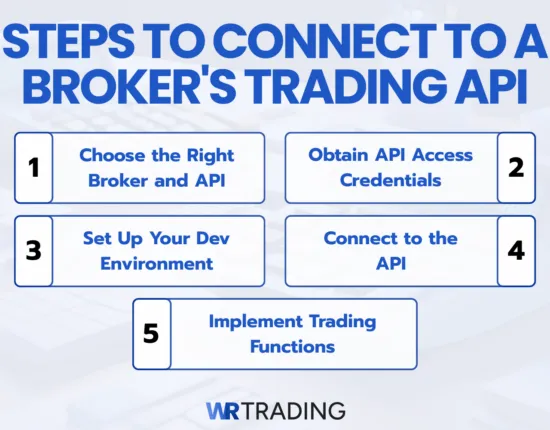
Connecting to a broker’s trading API can seem daunting at first, but by following a structured approach, you can integrate it smoothly into your trading setup. Here are the essential steps to get you started:
- Choose the Right Broker and API: First and foremost, select a broker that offers a trading API suited to your needs. Consider factors such as the types of APIs available (REST, WebSocket, FIX, or library-based), the range of supported trading instruments, execution speed, and the broker’s reputation. Once you’ve chosen a broker, sign up for an account and ensure you have access to their API documentation and support resources.
- Obtain API Access Credentials: After setting up your account, you’ll need to obtain the API access credentials from your broker. These credentials typically include an API key, a secret key, and possibly other authentication details. These keys are essential for securely connecting to the broker’s servers and ensuring that only authorised users can access your trading account.
- Set Up Your Development Environment: Next, set up your development environment. Depending on the type of API and your preferred programming language, you might need specific software tools or libraries. For REST and WebSocket APIs, you can use HTTP clients or WebSocket libraries in languages like Python, JavaScript, or Java. For FIX APIs, you may require specialised FIX engines. Ensure your environment is configured correctly to handle secure connections, data parsing, and error handling.
- Connect to the API: With your environment set up, you can now connect to the API. Begin by making basic requests to test the connection, such as retrieving account information or fetching market data. This step is crucial for verifying that your credentials are correct and that your setup is functioning as expected. Use the broker’s API documentation to guide you through the necessary endpoints and parameters.
- Implement Trading Functions: Once you’ve established a connection, start implementing trading functions according to your strategy. This includes placing orders, managing positions, and monitoring account status. You can set up real-time data feeds to receive live market updates. Ensure your code handles different order types and can manage risk appropriately. Testing these functions thoroughly in a demo environment before moving to live trading is highly recommended.
Which Trading Platforms Offer API Access?
MT4, MT5, TradingView, and cTrader are the main trading platforms you will see from brokers that offer API access, allowing you to run code inside the platform while your broker’s REST or FIX endpoints handle execution, data, and account control in the background.
Here are the main aspects of each trading platform to help you decide which one to choose:
- MetaTrader 4 (MT4): MT4 uses MQL4 for Expert Advisors, so your strategy can scan markets, place orders, and manage risk directly from the terminal, while your broker’s API supplies pricing, order status, and historical data for monitoring or post-trade analysis. Clear examples include Exness, Pepperstone, and IC Markets, which all provide MT4 plus API access so you can combine EA logic with programmatic tasks like reporting, risk checks, and batch downloads.
- MetaTrader 5 (MT5): MT5 uses MQL5 with built-in depth of market, and multi-asset support, and it pairs well with a broker’s API when you want server-side controls such as position netting, account queries, or large-scale backfill without leaving your MT5 workflow. Brokers such as Vantage Markets, IG, and Forex.com offer MT5 together with API connectivity so traders can script entries in the platform and manage everything else through code.
- TradingView: TradingView lets you design signals in Pine Script, trigger alerts from charts, and route orders to a connected broker, while the broker’s API handles tasks like order confirmations, account snapshots, and automated record keeping that sit outside the charting layer. Solid TradingView connections in this space include Capital.com, FXCM, and IG, so you can trade from TradingView and still automate the operational work through the broker’s endpoints.
- cTrader: cTrader provides C Sharp based automation through cTrader Automate and an Open API, giving you event-driven bots and direct programmatic access for building, testing, and deploying strategies that talk to the broker reliably at speed. Brokers that support cTrader and offer API connectivity include Pepperstone, IC Markets, and BlackBull Markets, which makes it straightforward to run custom bots while keeping FIX or REST available for data and risk control.
How Can a Forex Trading API Be Utilized to Obtain Live Market Data and Historical Market Data?
Live market data is delivered through a streaming or “subscribe” connection that your forex broker’s API provides, so you generate an API key, pick a supported SDK such as Python or Java, and then subscribe to the symbols you need by sending a request that names each pair and the update format, which is usually ticks or time-based snapshots like one second or one minute.
The stream returns time-stamped prices, such as bid and ask, together with volume. Your code updates charts or indicators as each message arrives, and you normally store the latest few minutes in memory and also save the feed to a simple database or file so your tools can refresh a view, rebuild an indicator, or trigger a trade without losing the context.
Historical data comes from the same API by asking for candles over a chosen timeframe with a start and end date, and long ranges get pulled in sensible chunks until the backfill finishes cleanly. Reliable research starts by matching the broker server time zone, picking the price type, such as bid, ask, or mid, and filling gaps created by rollovers or maintenance so tests do not have false signals.
A simple workflow downloads a clean history once for research, refreshes it each day for new bars, and merges it with the live cache so you have one continuous series for modeling, backtesting, and performance tracking.
Benefits of Trading With APIs
Trading with APIs provides numerous benefits that can significantly enhance your trading experience. Here are some of the key benefits you can enjoy:
- Automation of Trading Strategies
- Access to Real-Time Market Data
- Enhanced Trading Speed and Efficiency
- Customisation and Flexibility
- Better Risk Management
- Scalability for Growth
Automation of Trading Strategies
One of the most compelling benefits of using trading APIs is the ability to automate your trading strategies. With an API, you can program your trading system to execute trades based on predefined criteria. This means you no longer have to be glued to your screen, waiting for the perfect moment to place a trade. Automated trading can help you capitalize on market opportunities 24/7, even when you’re asleep or busy with other tasks. By removing human emotions from the trading equation, APIs can help you stick to your strategy and avoid impulsive decisions that could negatively impact your results.
If you are considering learning new trading strategies, join the WR Trading course. This course provides an in-depth look at winning forex strategies and offers several additional benefits, including informative webinars, trade analysis, and personalised support.
Access to Real-Time Market Data
Trading APIs provide access to real-time market data, which is essential for making informed trading decisions. This data includes live price quotes, trade volumes, and other important market indicators. Having up-to-the-second information allows you to react fast to market movements and execute trades at the best possible prices. Additionally, many APIs offer historical data, enabling you to backtest your strategies against past market conditions. This can be invaluable for refining your trading approach and improving your overall performance.
Enhanced Trading Speed and Efficiency
Speed is of the essence in trading, and APIs can significantly boost your execution speed. Manual trading is subject to delays, human error, and slower reaction times. In contrast, an API can execute trades almost instantaneously, ensuring that you can take advantage of even the smallest market movements. This is particularly beneficial for high-frequency trading strategies, where speed is crucial. Moreover, APIs can handle multiple trades simultaneously, increasing your efficiency and allowing you to manage a more complex portfolio with ease.
Customisation and Flexibility
Trading APIs provide a high degree of customisation, allowing you to tailor your trading platform to meet your specific needs. Whether you want to create custom indicators, develop unique trading algorithms, or integrate third-party tools, APIs provide the flexibility to build a trading system that works best for you.
This level of customisation is not typically available with standard trading platforms, making APIs an excellent choice for traders who want to innovate and optimise their trading strategies.
Better Risk Management
Effective risk management is crucial for long-term trading success, and APIs can help you manage risks more effectively. By automating your trading strategies, you can ensure that risk management rules are consistently applied. For example, you can set stop-loss and take-profit levels to automatically close trades at predetermined prices, limiting your losses and securing your gains. Additionally, APIs enable you to monitor your positions and account balance in real-time, providing the necessary information to make informed adjustments to your risk management strategy.
Scalability for Growth
As your trading activities grow, managing them manually can become increasingly challenging. Trading APIs provide the scalability needed to expand your operations without compromising efficiency. You can handle larger volumes of trades, manage multiple accounts, and execute more complex strategies with ease. This scalability is essential for traders looking to grow their trading business or for institutional traders managing substantial portfolios.
How Much Does It Cost To Trade Via Forex API?
Access to a broker’s API is free once you have a funded live account, so the main cost you face comes from the usual trading charges, such as spreads, commissions per lot, and overnight financing. Some brokers add optional fees (for example $40/month) for premium connectivity like FIX gateways, higher request limits, or large historical data downloads, and you may also see a monthly platform or volume requirement for those premium tiers, so check the exact terms before you deploy.
An automated setup can be more efficient than manual clicking because your code sends consistent orders, reduces input mistakes, and can route trades faster, which helps control slippage and improves fills.
Can Trading Via API Be More Cost-Effective?
Yes, trading via an API can be more cost-efficient because the code places orders the moment your rules are met, which reduces slippage, avoids fat-finger errors, and keeps position sizing exact on every trade.
Automated logic can switch between limit and market orders based on spread width, cancel and replace quickly when quotes move, and enforce stops and targets without hesitation, so the effective cost per trade drops through tighter entry prices and fewer mistakes.
Many brokers provide API access at no extra charge once an account is funded, so your main expenses come from a VPS or cloud server, monitoring, storage, and the time spent building and maintaining the strategy.
Efficiency improves when you stream prices instead of polling, request only the pairs you actually trade, reuse connections, and log fills to measure spread, commission, and slippage as a single number that you track each month. The efficiency compounds as trade count grows, which is where an API setup can be valuable.
Algorithmic Trading via Trading APIs
Algorithmic trading uses automated pre-programmed trading instructions to execute trades and manage positions on behalf of the trader. These instructions are based on variables such as time, price, and volume, allowing for high-speed, high-frequency trading that can capitalise on market opportunities in milliseconds. Trading APIs are the backbone of algorithmic trading, providing the necessary interface to connect trading algorithms directly with a broker’s trading platform.
Trading APIs facilitate algorithmic trading by allowing traders to develop and implement custom trading strategies using their programming skills. By utilizing an API, traders can create algorithms that continuously scan the markets for predefined conditions. Once these conditions are met, the algorithm can automatically execute trades, adjust positions, or even cancel orders, all without human intervention. This level of automation is particularly beneficial in the forex market, where prices can fluctuate rapidly, and the ability to react quickly can significantly impact trading outcomes.
Conclusion
In conclusion, our top picks at WR Trading for forex trading brokers with trading APIs include Vantage Markets, BlackBull Markets, Pepperstone, and IG. Each of these brokers offers fast and reliable API solutions to take your trading to the next level. Whether you’re looking to automate your trading strategies, access real-time data, or execute trades with lightning speed, these APIs provide the tools you need.
Overview of the Top Forex Brokers With Trading APIs:
- Vantage Markets – Excellent customer support with Vantage FX API.
- BlackBull Markets – Advanced API features with BlackBull Markets API.
- Pepperstone – Comprehensive API documentation with Pepperstone API.
- IG – Extensive market access with IG Labs API.
- IC Markets – Best for ultra-fast execution under 40 ms
- Capital.com – Best for beginner-friendly REST API integration
- FXCM – Best for multiple API options (REST, FIX, Java, ForexConnect)
- Exness – Best for unlimited leverage on API-supported accounts
- IC Trading – Best for combining FIX API with cTrader Automate
- Forex.com – Best API FX Broker for US traders
Frequently Asked Questions on Forex Brokers with Trading APIs
Why Should I Use a Broker With a Trading API?
Using a broker with a trading API allows you to automate your trading strategies, ensuring consistent execution without manual intervention. It provides access to real-time market data and historical data, essential for making informed trading decisions and backtesting strategies. Additionally, it enhances trading speed and efficiency, which are crucial for high-frequency trading.
Which Brokers Offer the Best Trading APIs?
Top brokers offering robust trading APIs include Vantage Markets, BlackBull Markets, Pepperstone, and IG. These brokers provide reliable API solutions that support a range of trading strategies, from basic automation to sophisticated algorithmic trading. Each broker offers unique features, making them suitable for different types of traders.
How Do I Choose the Right Forex Broker With a Trading API?
To choose the right forex broker with a trading API, consider factors such as the ease of integration, the range of supported trading platforms, the quality of customer support, and the specific features of the API. Look for brokers with comprehensive documentation and reliable technical support. Additionally, consider the broker’s spreads, leverage options, and the number of forex pairs they offer.
Can Beginners Use Trading APIs Provided by Brokers?
Yes, beginners can use trading APIs provided by brokers, although some programming knowledge is beneficial. Many brokers offer comprehensive documentation and support to help new users get started. APIs like those from Vantage Markets and Pepperstone are renowned for their user-friendly interfaces and exceptional customer support, making them accessible to beginners.
What types of trading platforms are compatible with broker APIs?
Broker APIs are compatible with various trading platforms, including popular ones like MetaTrader 4, MetaTrader 5, and cTrader. Some brokers offer proprietary platforms that integrate seamlessly with their APIs. Compatibility with multiple platforms enables traders to select the one that best suits their trading style and needs.








